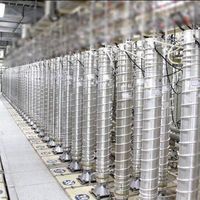Critics call for honesty from Pezeshkian amid rising war tensions
Some Iranian "reformists" who supported President Masoud Pezeshkian in the election are now criticizing him for breaking promises and appointing political rivals to key government positions.
The criticism also reflects growing tension, partly fueled by Israel's threats pf military retaliation in response to Iran's October 1 missile attack.
In response to Ali Asghar Shefieian, an aide to President Pezeshkian who defended the president's recent government appointments, Javad Emam, spokesperson for the Reform Front—an umbrella group coordinating over two dozen groups—posted on X: "Why did the people vote for Pezeshkian? For no change? To endorse the ultraconservative Paydari Party’s agenda? To continue the previous government's political and security policies? To prolong regional tensions? To keep filtering the Internet and maintaining the Morality Police, and to let the military steer domestic politics? Or to ignore his supporters and campaign workers?"
Meanwhile, many social media users argued that things would not have been different had Pezeshkian’s rival won the election. Mocking Pezeshkian's campaign slogans, they posted satirical comments as if hardliner Saeed Jalili were now president, saying, "If Pezeshkian were president, the shadow of war wouldn’t loom over Iran. The EU wouldn’t have called the three Iranian islands occupied, and it wouldn’t have sanctioned Iran!" Nearly all such posts emphasize the looming threat of war between Iran and Israel.
In another development, prominent "reformist" figure Mostafa Hashemi Taba urged the government to be transparent with the public and "tell them the truth." He also called on President Pezeshkian to address discrimination and curb unnecessary government spending.
Criticizing Pezeshkian's idea of national reconciliation, Hashemi Taba said, "The president has appointed individuals with varying political affiliations to key jobs in various areas, but it seems they are not committed to their mandate. In this way, the government looks like a joint stock company that has no particular policy or methodology." Meanwhile, he pointed out that the selection of the government's middle managers has been done with a bad taste.
Stressing the need for government transparency, Hashemi Taba said President Pezeshkian could maintain public trust by keeping his promise to be honest with the people. As an example, he cited the government's claim that 20 million liters of gasoline are being smuggled out of Iran daily. He questioned the Oil Ministry's role, noting that it controls all aspects of gasoline. "How is the Oil Ministry merely watching as gasoline is imported and smuggled out of the country?" he asked.
Hashemi Taba hinted at government involvement in fuel smuggling, saying, "The government shouldn't reveal only 10 percent of the truth and remain silent on the other 90 percent." He added, "The 20 million liters of gasoline doesn’t come from gas station nozzles—it's too much, and there must be a system behind it. If they were honest with the people, they might not need further economic reforms." He also emphasized that "ending discrimination and curbing overspending should be central to the government's agenda."
Further criticizing Pezeshkian's notion of national reconciliation, Hashemi Taba remarked, "What we are witnessing is not true national reconciliation, which cannot be achieved under the current circumstances." He noted that the political rivals appointed to government positions are unlikely to change their views. "There must be a clear policy in place, and individuals from different political backgrounds should be committed to following that policy," he added.
Elaborating on the theme of honesty with the public, reformist activist and social media influencer Mehdi Mahmoudian wrote on X: "Pezeshkian is an honest man. He openly admitted that everything he did during the campaign was to win votes, and that after his victory, he would follow Khamenei's directives." Mahmoudian also accused Pezeshkian of catering to the 20 percent of eligible voters who supported him, while now showing an iron fist to the 60 percent who chose not to vote.







